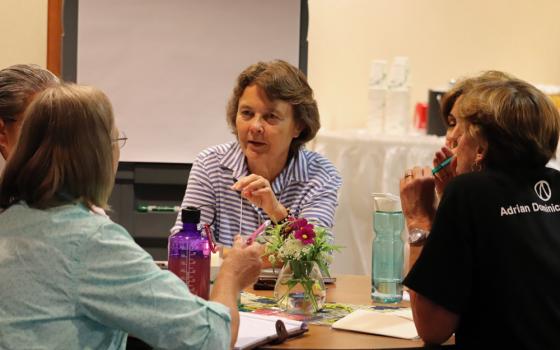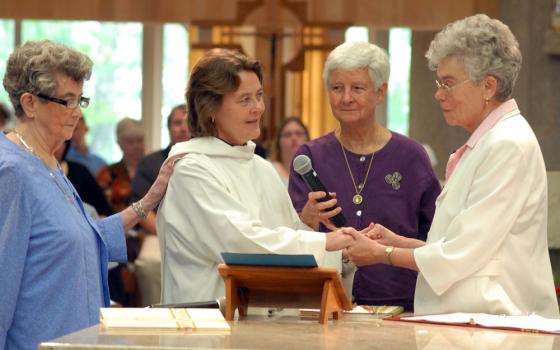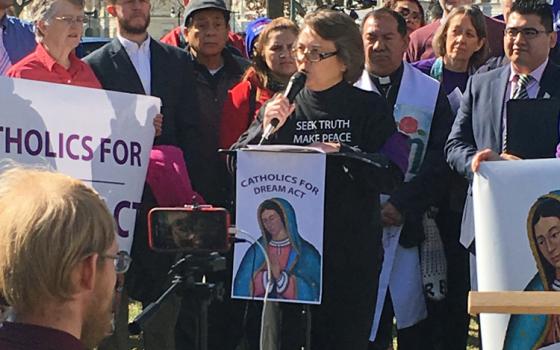Adrian Dominican Sr. Elise García is used to finding herself between two worlds.
Her father is the son of Spanish immigrants to the United States, and her mother is a daughter of Norwegians. García is an American but lived nine years of her childhood in Mexico, Uruguay and Egypt. She's 69 years old but has only been in religious life for 14 years, so she identifies both with sisters of her own age and younger sisters still relatively new to being a sister.
That, she said, will help immensely in her next three years as part of the presidential triumvirate of the Leadership Conference of Women Religious. Elected Aug. 15 at the group's annual assembly, García will be president-elect this year, followed by a year as president then another as past president.
LCWR is also in transition, she said. It is in the midst of an emergent planning process to determine how best it can serve the leaders of women religious. Religious life in general is changing as the number of sisters drops and the number of laypeople involved in sisters' ministries increases. Women who have joined religious life in recent decades are more culturally, ethnically and racially diverse than ever, a trend expected to continue, and younger sisters are clamoring to have their voices heard.
And because there apparently wasn't enough transition in her life, García said, one day after returning from the assembly, she moved to a new home.
García, a Global Sisters Report contributor, received a Master of Arts in theology in 2009 from the Oblate School of Theology and has overseen her congregation's technology and communications.
In 2002, she co-founded Santuario Sisterfarm, an ecology center in Boerne, Texas, dedicated to cultivating biodiversity and cultural diversity, and co-directed* the nonprofit until it closed in June 2011. Santuario Sisterfarm also established Sor Juana Press, which until 2010 published books by and about Dominican sisters; García was founding editor.
García has also served as director of communications and development for St. Mary's University School of Law in San Antonio, Texas, and vice president for membership and media communications for Common Cause, a watchdog and advocacy group in Washington, D.C. She also holds a bachelor's degree in English literature from Windham College in Vermont.
GSR: Many people do not like being in two worlds, feeling that they don't belong to either. Do you see it that way?
García: A great gift for me while I was living in south Texas was really living in the borderlands, which has been my entire life experience.
It's hard being in the space between, never fully belonging to one or the other. I spent the formative years of my childhood in Latin America, living four years in Mexico and three years in Uruguay, so Spanish became my dominant language, and I had a hard time returning to the States, where everything was English. So I was always having this borderlands experience of being in one context but being of another context.
But it became a gift. I would say I'm living in the borderlands of religious life right now, providing a lens I think allows me to see a little of both sides.
How did you come to live overseas as a child?
My father was in the Foreign Service. Because Spanish was his first language, he was a Latin America specialist. Then later, they decided to put people in posts that were different from their backgrounds, so as a teenager, I spent two years in Egypt.
And how did you come to join religious life decades later than most?
It was a long process. I first began to be exposed to religious life in the late 1980s, when I served as a consultant to a number of nonprofits in Washington, D.C., including Network, and I realized the most interesting, dynamic people I was meeting were all sisters.
In 1992, I moved to San Antonio to work at the St. Mary's University law school and basically lived in community with Adrian Dominican Sr. Carol Coston and Immaculate Heart of Mary Sr. Nancy Sylvester. We co-founded Sister Farm, which in 2002 was formally established as a nonprofit called Santuario Sisterfarm as a collaboration between the Adrian Dominicans and Latina women of the borderlands.
I was obviously very much connected to the life of women religious but never much called to enter until later. As a friend put it: "You've been auditing the course, and now you're finally taking it for credit."
There's a lot of discussion about the divide between younger sisters and older sisters. But again, you find yourself with a foot in both worlds.
I'm very much a bridge. I've inherited from both my parents youthful looks, so most people assume I'm much younger than I am. I've had those years of experience where most of my adult life was spent in ministries that Catholic sisters would engage in, but my experience of religious life is that of a millennial. All my friends in religious life who are my age are celebrating their 50th jubilees, but I'm still relatively new to this.
What led you to keep your name in nomination for the LCWR presidency?
I spent quite a bit of time discerning this, and there were three considerations.
One, I was called to this by a number of leadership teams I respect and admire.
Two, our Adrian Dominican General Council spent a sacred hour* in discernment because we knew it was going to involve all of us. We really discerned whether we as a congregation wanted to make the commitment to be of service to all of religious life.
And three, by virtue of my chronological age, I'm a Medicare-card-carrying member of the boomer generation, but I'm also a millennial by my age in religious life, so I carry that whole sense of intergenerational and intercultural direction we're moving in.
Many people fear and avoid change, but the leadership of LCWR has been trying to embrace change. Where do you see the organization going?
I think we as a conference are really well-positioned right now with the emergent planning process in place, with the greater consciousness of our global sisterhood, our drive to engage more fully with our partners in mission and our renewed* emphasis on our mission in the public square, and making our voices heard.
As Sr. Sharlet Wagner said in her presidential address, we're working on creating an intentional space for the new religious life to emerge and for younger members to carve their own pathways forward. Connected to that is the diversity of women who have entered in the last several decades, and to create a space where that rich diversity becomes a gift to the world is something I'm really excited about participating in.
[Dan Stockman is national correspondent for Global Sisters Report. His email address is dstockman@ncronline.org. Follow him on Twitter or on Facebook.]
*This story has been updated to clarify language.




